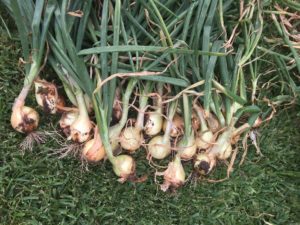You don’t have to be a cook to know how delicious onions are. If you’re looking for mouthwatering, savory flavor to enhance other foods, cooked or raw, onions are your go-to veggie. Or, when you cut them into slices and bake or sauté them whole, all by themselves, drizzled with olive oil or avocado oil and sprinkled with dried thyme, rosemary and/or basil, the fragrance and flavor are simply heavenly.
Onions are also impressive because they’re such a healthy food, imparting vitamins, minerals and powerful compounds that, besides making your eyes water when you cut into them, also help heal your body. The knife you use to slice them can make all the difference. When certain vegetables get nicked or cut, they’ll produce even more polyphenols to protect against damage. Cutting with ceramic knives can help slow the browning process that naturally occurs when slicing certain vegetables and fruits such as avocados.
These anti-inflammatory, antifungal, antimicrobial (inhibiting the bacteria Helicobacter pylor), antibacterial, antiviral, antidiabetic and anticarcinogenic compounds can actually minimize, treat and even help prevent disease, including coronary artery disease, diabetes, stroke and cancer, and numerous so-called “lesser” ailments that lead to those more serious conditions. It can’t get better than that, right? What if they’re red onions? What if they’re organic, as well?
The Curious Power Behind Red Onions
Well, as it happens, studies show that when red onions, specifically, were pitted against white onions (while yellow onions, having more pigment than the white ones, also contained more disease-fighting flavonoids), the aforementioned nutrients went way beyond what scientists had already known they could do. In short, the Canadian study reported:
“Flavonoids, which are found in high levels in onions, have been shown to exert antiproliferative and potentially anticancer activities. To test their therapeutic potential, we assessed the antiproliferative, cytotoxic, apoptosis-inducing, and anti-migratory activities of five onion varieties grown in Ontario against human adenocarcinoma cells.
How Quercitin in Onions Can Impact Your Health
Quercitin contains molecules that can zap harmful free radicals in your system caused by toxic substances you might encounter from day to day, such as pollution, chemicals in your water and food and even stress. The effects of these can lead not only to cancer but many other debilitating conditions exacerbated by inflammation.
Research has also revealed quercitin’s association with cancer prevention, inhibiting the growth of breast, prostate, stomach, endometrial, esophageal, ovarian, lung and colon cancer cells, and many more. A University of Maryland Medical Center article listed several more findings in regard to this powerful compound, in terms of prevention and treatment:
- Allergies, asthma, hay fever and hives, as it prevents immune cells from releasing histamines
- Optimized cholesterol, as it prevents damage to LDL cholesterol
- Interstitial cystitis and accompanying bladder pain
- Inflammation of the prostate (prostatitis), due to fewer symptoms
- Rheumatoid arthritis (RA) — “There are reports of people with RA who had fewer symptoms when they switched from a typical Western diet to … [one] with lots of uncooked berries, fruits, vegetables, nuts, roots, seeds and sprouts containing quercetin and other antioxidants.”
What Else Do Compounds in Onions Do for Health?
Kaempferol helps to prevent oxidative damage of our cells, lipids and DNA, and according to Phytochemicals.com, is a chemopreventive agent that may “prevent arteriosclerosis by inhibiting the oxidation of low density lipoprotein and the formation of platelets in the blood.”
Anthocyanins are another extremely important antioxidant element in onions. Responsible for the bright color in the red and purple onions (as they are in red cabbage, red and purple grapes and other berries, kale and beets), they can also kill breast and colorectal cancer cells.
Allicin is another compound found in members of the allium family, which includes onions, leeks, shallots and scallions, as well as chives and garlic. (And, in fact, allium is the Latin term for garlic.) Two onion compounds, allium and allyl disulphide, convert to allicin when onions are chopped or crushed, when the enzymes are released. Numerous sulfur compounds in onions, garlic and other allium vegetables (which you can smell) play a large part in cancer prevention, blocking DNA damage and helping to magnify their antioxidant capabilities. Supporting the role of this element in onions, another study notes, “Sulfur- and selenium-containing compounds have the capacity to protect against several kinds of cancer development.”
What’s the Significance of Organic Onions?
Some studies have concluded there’s no difference between conventionally farmed and organic, whether it’s onions in question or other foods. In fact, a review involving more than 200 studies seemed the final word, until additional studies on the benefits of organic farming were conducted in relation to the phytochemicals in the foods produced.
Scientists came to the conclusion that organic is better in every respect, and dramatically so. Scientists then engaged in more in-depth analysis with a six-year study on two onion varieties, Hyskin and Red Baron, examining the effects of conventional, organic and mixed cultivation practices on many of the bioactive compounds previously listed, such as flavonoids, individual flavonols and anthocyanins, in part for their antioxidant capacity.
At the end of the study, all were higher in the organic specimens, with differences, they wrote, “primarily due to different soil management practices used in organic agriculture rather than pesticide/ herbicide application.”
Simply stated, eating organic, whether it’s onions or anything else, is so much better for you, not just because the health of the soil may enhance the nutritional value of the produce itself, but because standard, conventional gardening and farming methods use toxic pesticides and other harmful practices without taking into consideration the damage being done.
Rather than gaining as many disease-fighting vitamins, minerals and arguably hundreds of phytonutrients, your body is instead fighting the poisonous effects of substances like glyphosate, which studies have shown can attack several of your body’s most vital systems, damage reproductive organs and likely cause cancer.
Onion Preparation: Releasing ‘Pungent Chemical Warriors’
Cooked onions, as we already observed, are quite delicious, but it’s the raw form that packs the most punch nutritionally. But there’s also baking, sautéing and boiling to consider, which one study tackled and observed that baking and sautéing produced a 7 percent to 25 percent increase in quercetin concentration, while boiling produced an 18 percent decrease. Health.com notes:
“The best way to get those valuable nutrients is to eat onions themselves; for the biggest nutritional punch, choose red and eat them raw, since cooking destroys some of their antioxidant properties.”
Source: http://articles.mercola.com/sites/articles/archive/2017/08/28/organic-onions.aspx




